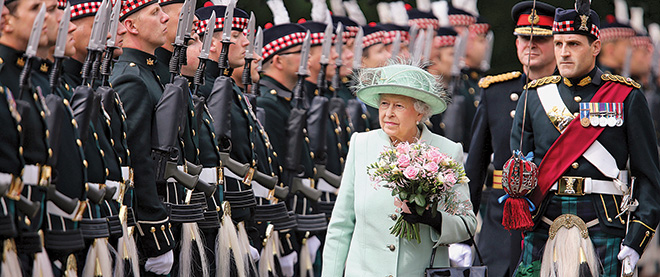Scotland: New Country, same currency, same Queen?
The Scottish nationalist movement meets the monarchists
Andrew Milligan / Keystone Press
Share

One of the minor annoyances of being a monarchist is the way the royal family is still sometimes lampooned as a gang of inbred German princelings. This was fair in the time of Queen Victoria, but few seem to notice that the present sovereign’s mother grew up in the spooky Shakespearean precincts of Glamis Castle. The man no one expected to become George VI took a Scottish bride, not suspecting the result would be to add a strong literal streak of Scottishness to a lineage whose German side was already mesmerized by the romance of Highland wilderness and traditions.
The royals have consciously tried to stay anchored in Scotland, where the Prince of Wales went to public school and his son attended university. But has the effort borne fruit? The Scottish parliament is now dominated by the pro-independence Scottish National Party (SNP), creating an awkward tension between state and Crown that is tearing open. The SNP is widely perceived as republican; it has republican intellectual roots and formally republican component organizations. But Scotland itself still tilts monarchist on the whole, and it greeted the arrival of the master of Strathearn (the new Prince George’s Scottish courtesy title) with enthusiasm.
The SNP’s leader, First Minister Alex Salmond, has been working hard to keep the monarchy from becoming an issue in the approaching 2014 independence referendum. He is not having much luck. On July 28, Dennis Canavan, a pre-Blairite Labour MP who was later tossed out of the party and sat as a star independent in the Scottish parliament, told BBC Scotland that if the yes-to-independence side wins the 2014 referendum vote, a second vote on retaining the monarchy should follow.
“In an independent Scotland,” Canavan said, “the people should be given an early opportunity to decide whether they want a hereditary head of state or an elected head of state. A hereditary head of state is an affront to democracy and a complete anachronism in a modern 21st-century democracy.” Canavan emphasized that he was speaking “in a personal capacity,” and it would probably not be a big deal either way . . . if he were not the official chairman of the yes campaign.
Salmond, as he seeks to become head of an independent Commonwealth government like Canada’s, faces a fascinating problem. He must build a coalition for independence that includes both moderates and crusty old fighting republicans like Canavan. The republican left within his own party, and in other secessionist parties like the Greens and the Socialists, scorns Salmond’s effusive enthusiasm for the Queen. Radicals like Canavan believe that if Scotland is going to split the United Kingdom, it might as well get rid of the kings along with the Union.
But Salmond doesn’t want Scottish independence to seem like a risky utopian project. At every turn he reassures Scottish voters that everything would continue much as before, only slightly nicer, with the Scots masters in their own house. This is not even his first clash of this kind with Canavan; in May, Canavan came out in favour of a new Scottish currency, contradicting the SNP’s stated intention of remaining in a currency union with the rump U.K. (A currency union is what most economists favour, but if Scotland kept the pound it would be leaving a major lever of its economy with the Bank of England and Mark Carney.)
Salmond’s attachment to the monarchy may be more sincere than he is usually given credit for. In May 2011 he remarked in an interview with the British magazine Prospect that, “There is a better case for an English republic than a Scottish one.” Historically, the first minister argued, “inequalities in Scotland are not generally linked to the monarchy.” For better or worse, however, Salmond’s conservatism doesn’t seem to be helping the argument for independence. The SNP won 44 per cent of national first-choice votes in its 2011 Scottish election victory, but the yes side has never broken through 40 per cent in any major opinion poll on secession.
The “no” supporters say their opponents are papering over uncertainty about the consequences of a yes vote. Even without possible fights over the Crown and the currency, there are open questions about independent Scotland’s share of the national debt, its precise status in the European Union, and its ability to underwrite public services as generously as the U.K. does. There is a long road from today to Sept. 18, 2014, but Alex Salmond may be destined to be Scotland’s René Lévesque: a statesman better loved than his cause.
On the web: For more Colby Cosh, visit his blog at macleans.ca/colbycosh